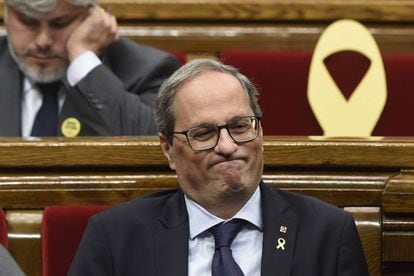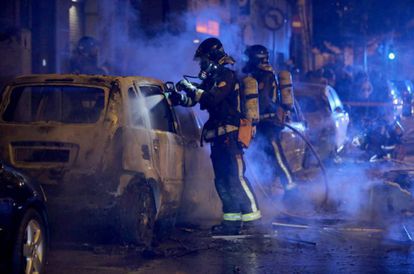Catalan premier comes under pressure for response to violent street protests
Quim Torra has been criticized for not doing more to stop the unrest, which erupted after the Supreme Court sentenced nine separatists to prison for their role in the 2017 breakaway attempt

The premier of Catalonia, Quim Torra, has come under attack for not doing more to stop the street violence that has been ongoing in the region since Monday, when the Supreme Court sentenced nine separatist leaders to prison for their role in the 2017 breakaway bid.
We cannot allow groups of infiltrators and provocateurs to destroy the image of the independence movement
Catalan premier Quim Torra
Torra waited until after midnight on Wednesday night to explicitly condemn the violent protests, which have caused major unrest across Catalonia, especially in Barcelona, with demonstrators blocking roads, setting fire to trash containers and disrupting operations at the city’s El Prat airport.
But despite the disturbances, Torra chose to appear yesterday at the head of a protest march against the Supreme Court ruling, which sentenced nine separatists leaders to between nine and 13 years in prison after finding them guilty of sedition.
Spain’s caretaker Prime Minister Pedro Sánchez of the Socialist Party (PSOE) called on Torra and other separatist leaders to publicly condemn the violence, stating at a press conference on Wednesday: “We are going to modify our response according to the actions and decisions of the independence leaders.

“I will not allow violence to prevail over social harmony,” said Sánchez, at the same time as protesters were setting fire to trash containers and cars in the center of Barcelona. There were also serious clashes in Girona, Lleida and Tarragona. Thirty-three people were arrested and 100 required medical attention
Torra, however, seemed determined to use the street protests against the Supreme Court ruling to build momentum for the independence movement, even though less than 10% of Catalan people believe this is the correct route, according to the regional government’s own surveys. Indeed, many of Torra’s councilors have been much more explicit about condemning the violence.
In the end, the Catalan premier finally decided to criticize the street unrest in a short televised message on Wednesday night. “The independence movement is not and has never been violent. We have always condemned and will condemn violence,” said Torra. “We cannot allow groups of infiltrators and provocateurs to destroy the image of the independence movement, we cannot fall into the trap,” he said, in reference to his claim that the violence was being caused by outsiders seeking to damage the reputation of the pro-independence movement.
Torra’s delayed response to the violence has sparked renewed calls for his resignation
But Torra’s delayed response to the violence has sparked renewed calls for his resignation. At an extraordinary meeting on Thursday, the leader of the Catalan branch of the Socialist Party (PSC), Miquel Iceta, argued Torra was “putting [Catalan] independence above social harmony” and should call new elections. This call was backed by the spokesperson of the center-right party Ciudadanos (Citizens), Lorena Roldán, who said Torra should “stop fooling the Catalan people.”
Torra, for his part, has refused to stand down and maintained that he will continue to fight for an independent Catalan republic. “I will defend to the end of this term that we exercise our right to self-determination again. We will do it again [...] No court will stop this Catalan premier from opening these debates,” he said.
Parties clash over Catalonia
Caretaker PM Sánchez met with the leaders of the opposition on Thursday to discuss a solution to the conflict in Catalonia. But with a fresh general election coming up on November 10, reaching consensus appeared to be out of the question.
Pablo Casado, of the conservative Popular Party (PP), wants the government to activate the National Security Law in Catalonia, a piece of legislation that lets “the relevant authorities contribute the necessary human and material resources” to maintain public order, as well as Article 155 of the Spanish Constitution, which would strip Catalonia of its autonomous powers. This article was invoked by former PP Prime Minister Mariano Rajoy in response to the 2017 unilateral declaration of independence.
Like Casado, Albert Rivera, from Ciudadanos, wants Article 155 to be activated immediately in order to oust Torra from power, while Pablo Iglesias, leader of the leftist anti-austerity party Unidas Podemos, has called for dialogue.
Sánchez, however, warned that the government “was not going to overreact” to the situation in Catalonia.
English version by Melissa Kitson.












































